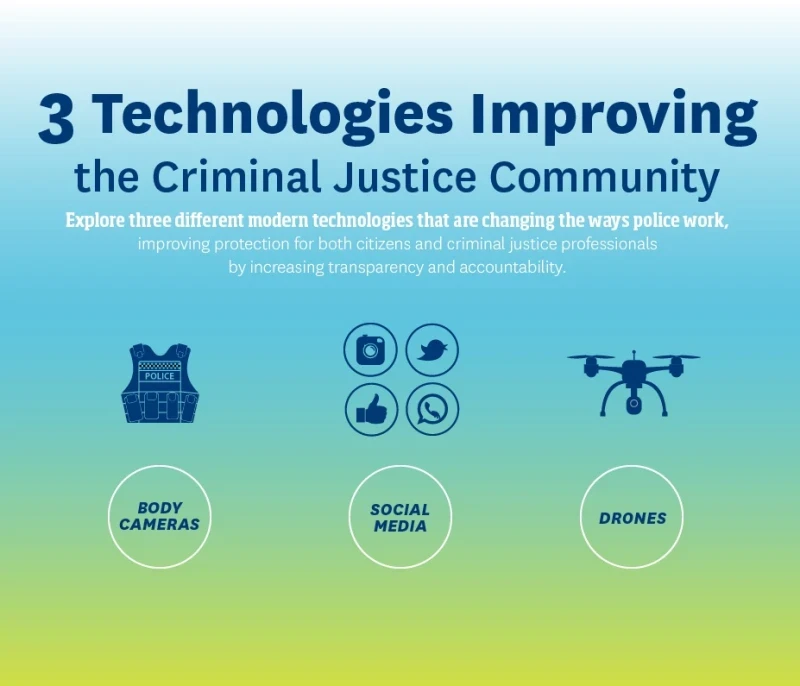Exploring Innovations in Police Work
As technology evolves, it adapts to our social habits and expectations while simultaneously broadening our awareness of local, national and international current events. In recent years, this has included greater awareness of community-police relations, a few specific instances of which have had tragic outcomes and caused public scrutiny of modern policing tactics. The cumulative impact of these incidents, in conjunction with an increasingly all-encompassing and remotely accessible internet, has necessitated the integration of more and smarter technology into contemporary police work.
Below, we’ve explored three different modern technologies that are changing the ways police work, improving protection for both citizens and criminal justice professionals by increasing transparency and accountability.
Body Cameras
The decisions police make on a day-to-day basis can have enormous impacts on individual lives as well as entire communities. One wrong decision can yield catastrophic outcomes, including the loss of life. For this reason, it is absolutely crucial that police be appropriately equipped to make immediate and just decisions when acting to protect the public.
One method police are using to improve their decision-making skills is the implementation of body cameras. In recent years, there have been multiple news stories featuring police officers who were questioned for their decision making while on duty. Bodycams provide a few essential elements that can improve policing: An accurate portrayal of the events in question, situational learning and improvement when the footage is used to improve policing practices, and increased accountability to the public.
An increasing number of U.S. cities are now incorporating bodycams into their forces’ equipment, such as the city of Chicago, which has equipped all of its officers with a bodycam.1
Social Media
People aren’t shy about sharing their lives on social media. Spaces like Facebook and Instagram feel personal and let users share their lives with friends in real time, no matter where they may be.
However, among the millions of posts about puppies and movies, there are also incriminating posts that can help police track down suspects in ways they never could before. Today police are using social media platforms like Facebook to gather information on criminals. There, they can often find public photos or messages that help link suspects to a crime. Police can also obtain a warrant to search suspects’ private profiles and use the information in court.2
Social media also allow the public to help the police in a greater capacity than ever before. If a person witnesses a crime, they can post information and photos and share it with their social media community as well as the police. This could help amplify the police’s ability to track down a suspect and protect the community.
Drones
The use of drones in police departments has been received with mixed reviews by the general public. In fact, a recent survey found that only 36 percent of people thought using drones for police matters was a good idea.3
Although drone surveillance remains a controversial issue, utilizing drones as first responders is proving to be extremely beneficial for public safety agencies across the country. By first sending a drone into a dangerous situation (a fire, bomb threat, hostage situation, etc.), firefighters and police forces are better able to assess the matter quickly, accurately, cost effectively and safely.3
The Future of Criminal Justice
The technologies moving society forward can be difficult to keep up with—for anyone. Implementing these technologies into the day-to-day work of a police force can be costly, and requires buy-in from the broader public and changes in the way that criminal justice operations are undertaken. But they also can present tremendous opportunities to increase public safety.
Moving forward, it will be increasingly important that policymakers craft new laws to ensure that bodycams, drones and social media are used safely and that police and the public are protected in their use. Until then, criminal justice professionals can stay on top of tech trends and apply them the best they can to assist their work.
Interested in learning more? Read about the study of victimology and then look into the online Master of Arts in Criminology and Criminal Justice program at Kent State University.
Sources:
- Retrieved on January 26, 2018, from chicago.suntimes.com/news/emanuel-to-announce-that-every-cpd-officer-now-has-a-body-camera/
- Retrieved on January 26, 2018, from cnn.com/2012/08/30/tech/social-media/fighting-crime-social-media/index.html
- Retrieved on January 26, 2018, from economist.com/news/united-states/21730243-presents-cities-choice-between-safety-and-privacy-more-police-departments-and






